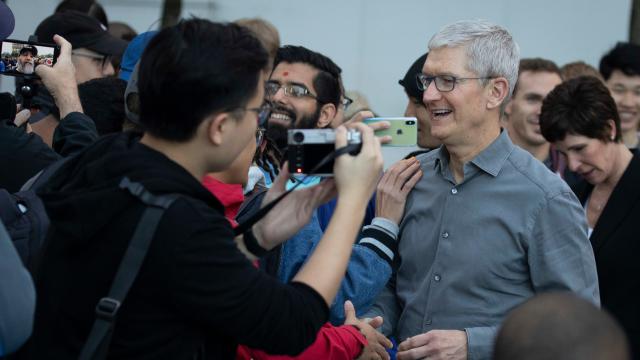Embattled face recognition startup Clearview AI is topping off a week of intense scrutiny over its nebulous law enforcement partnerships with an even bigger dose of bad news: Apple has reportedly disabled the iOS version of Clearview’s app citing violations of its developer program.
BuzzFeed first reported the news, saying Apple took action after learning the Clearview had sidestepped the Apple App Store and encouraged its clients to download a version of its iOS app reserved exclusively for developers; a violation of the terms of service for Apple’s Enterprise Developer Program.
Apple did not immediately respond for comment. Clearview CEO Hoan Ton-That told Gizmodo by email: “We are in contact with Apple and working on complying with their terms and conditions.”
Clearview has become the focus of controversy in recent weeks following a New York Times exposé that laid bear the firm’s questionable data collection practices. Clearview has reportedly scraped some three billion images off the internet to feed its face recognition tech, in many cases violating the policies of other companies such as Facebook and YouTube, which prohibit scraping and are now threatening legal action.
As BuzzFeed notes, Apple has previously suspended other companies for violating the developer program’s guidelines, including both Facebook and Google.
On Friday, Motherboard acquired a file of the data that Clearview has amassed on one of its reporters by taking advantage of the California Consumer Privacy Act—legislation that requires companies to turn over information they hold on California residents upon request. The reporter, Anna Merlan, submitted a picture of herself to the company, which it ran through its face recognition software. It later provided her with the results, a PDF displaying a range of photographs accumulated by the company taken as far back as 2004.
Earlier this week, BuzzFeed obtained documents that offered a list of Clearview’s clients, which—aside from the FBI, Customs and Border Protection, Interpol, and some 2,200 law enforcement agencies—include major U.S. retailers, including Macy’s, Walmart, and Best Buy, among companies in 26 other countries. (Clearview has previously stated that its app is for law enforcement purposes only.)
Colour of Change, the nation’s largest online racial justice organisation, issued letters to several companies said to use Clearview’s software, including the National Basketball Association, requesting they severe ties with the company.
“We already know Black people and marginalised communities are disproportionately exposed to the dangerous combination of racial bias in artificial intelligence technology and unchecked policing by the actors who use it,” Brandi Collins-Dexter, senior campaign manager at Colour of Change, said in a statement. “To now learn that major corporations are using Clearview’s ill-gotten data and employing dangerous facial recognition technology puts us all at risk, and requires immediate action. When it comes to retail, ‘Shopping While Black’ is an all too real experience that doesn’t need to be supercharged by discriminatory tech.”
Much of this news follows a story broken this week by the Daily Beast, which confirmed that Clearview had suffered a data breach that exposed the names of its clients and the number of times each had searched its database.
Gizmodo reported late Thursday night that it had obtained a copy of the Android version of Clearview’s face recognition app. Reporters decompiled the program and learned of various hidden features, some of which CEO Ton-That says are inactive. One would allow police to take photos of people to run through Clearview’s database, which as ACLU attorney Matt Cagle noted on Twitter, is prohibited under California law. Another mysterious feature is labelled “private search mode,” though its purpose is unclear; Ton-That did not respond to questions about the mode.
What’s more, Gizmodo reported that U.S. Senator Ron Wyden, a leading privacy hawk on Capitol Hill, had previously asked Clearview for a demonstration of its app’s abilities. The company initially agreed but has apparently postponed the meeting on multiple occasions.
